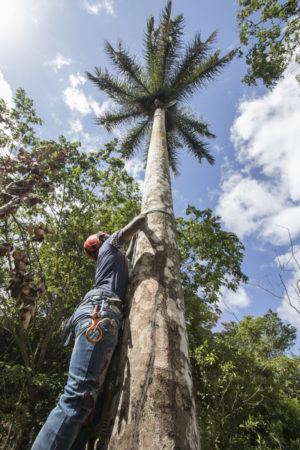
For almost everyone 2020 has been a year of challenges and unexpected changes. The onset of COVID-19 has required all of us to adapt in unforeseen ways. For those working on the Ridgway’s Hawk Conservation Project in Dominican Republic, it has been a year full of surprises, compromises and hope. Find out from Marta Curti what has happened with Ridgway’s Hawk and efforts to promote its conservation in the DR since COVID hit.
Over the past ten years, The Peregrine Fund has invested heavily in recruiting, hiring and training a local team of dedicated, hard-working and passionate parabiologists – local community members who assist conservationists working in the field. We believe our conservation projects can only be successful when they have the support, cooperation and involvement of local people. We believe in this so strongly that a major goal is to build sustainability by eventually having it managed entirely by locals. In a normal year we rely a great deal on our in-country staff, but 2020 put them to the test. They took up the challenge. Even though neither our project manager, Thomas Hayes, nor I were able to travel to Dominican Republic during 2020, our teams on the ground kept working despite the pandemic. Remarkably, they have achieved most of the project objectives to date.
The Most Successful Breeding Year
In 2009, we began a Ridgway’s Hawk reintroduction program in Punta Cana. Prior to that, hawks had not been documented in the area for decades. Thanks to this program, we observed the first successful breeding attempt in 2013, when a young male hatched and fledged from a wild nest. Each year thereafter, the population has been growing steadily. We are very happy to report that 2020 has been the most successful nesting season in Punta Cana to date! During this breeding season, our team monitored 18 pairs of Ridgway’s Hawks, 17 of which made nesting attempts. A whopping 21 nestlings successfully fledged, and our crew was able to band 18 of them. Placing bands on young birds is a way for us to monitor the survival of the fledglings and their dispersal patterns.
Some Hitches and Delays
While our field work continued quite smoothly, we had to postpone a few important activities due to COVID-19. First, we postponed releasing any additional young hawks at our second reintroduction site (Aniana Vargas National Park) until 2021. Despite this setback, our team continued to monitor the hawks we had released there in 2019. While it did not observe any successful breeding attempts this season, a few bonded pairs and some nest building activity were reported!
Adapting to the Pandemic with Online Education
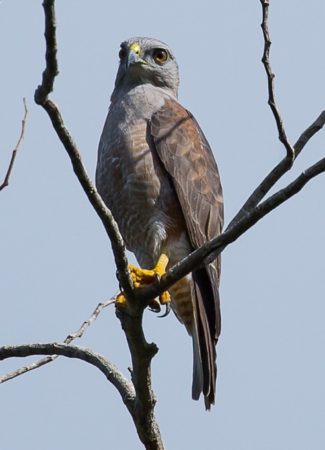
Our education and community outreach programs were negatively affected by the COVID-19 pandemic. We were unable to conduct face-to-face education outreach for most of 2020, and we had to postpone our pilot education campaign which had been scheduled for June.
This is disappointing after such great success in 2019 where, in October alone, we had reached 1,600 adults and children through our environmental outreach program. We were also unable to build on 2019’s outreach momentum. We had distributed 10 chicken coops, held 3 workshops (reaching 34 people, 19 of which were teachers) and visited 18 communities and 4 schools. However, islanders and conservationists are always willing and able to adapt to adverse situations. Although we could not engage in any live Ridgway’s Hawk Day activities this year, we hosted an online presentation followed by a question and answer session with members of our field teams in Los Limones and Punta Cana. We had 17 participants for this event.
An Exciting New Education Guide Goes Bilingual
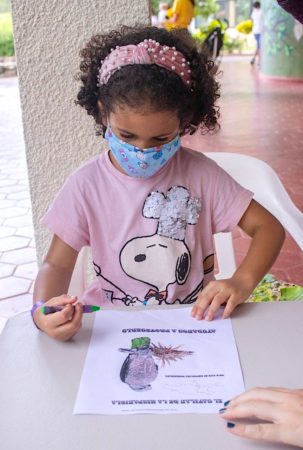
We designed and printed new bilingual education materials (in Spanish and Haitian Creole). We provided some of these materials to our counterparts in Haiti for their community education activities. We continue to work on the text and design of our raptor-based environmental education guide, which we originally planned to distribute only in the Dominican Republic. The scope of the guide has now grown, and it will be made available to educators throughout the Caribbean, available in English, Haitian, and Creole Spanish.
Happily, last month, we were able to begin face-to-face educational programs on a limited basis. Partnering with the local platform ZOODOM, we worked with 12 children and 8 adults. They saw a live Red-tailed Hawk and Ashy-faced Owl and then received a short presentation on the Ridgway’s Hawk. Afterwards, the children colored a picture of the Ridgway’s Hawk.
The COVID Experience Has Taught Resilience
As we look to 2021, a great deal of uncertainty remains regarding travel and our ability to carry out face-to-face programs. Our main concern is the safety of our teams and the people in the communities where we work. However, what 2020 has taught us is that we are resilient and so is the Ridgway’s Hawk. Despite the pandemic, this year’s results and the efforts of our team truly give us hope that our project’s sustainability goals are achievable. The long-term protection of this Critically Endangered raptor is also making progress, before our very eyes. We want to thank the Betty Petersen Conservation Fund and all its supporters for making this work possible. Even in the midst of a global pandemic, please rest assured that we will carry on the work and the dream of community-based conservation.
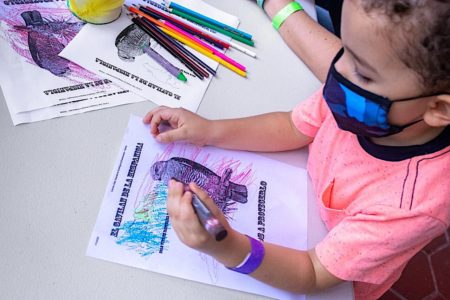
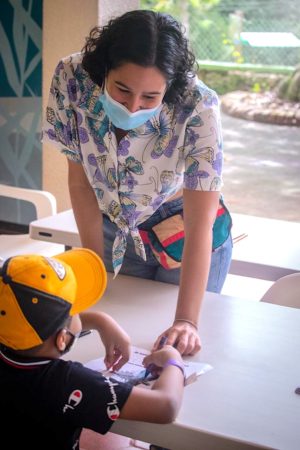
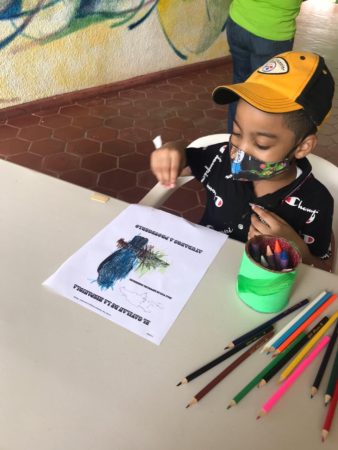
Find out more about the work of The Peregrine Fund to save this critically endangered raptor and read past updates from the project here:
And find out more about Ridgway’s Hawk here:
